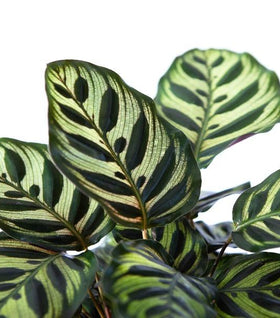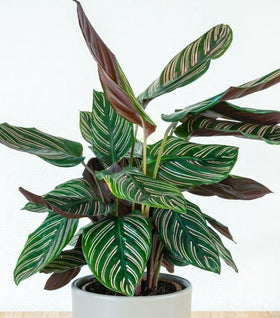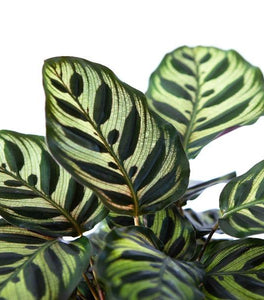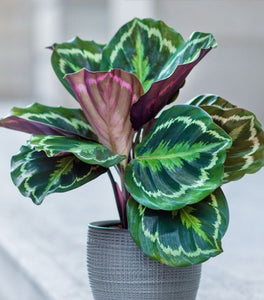Images Depict Mature Plants
Calathea Burle Marx Plants for Sale Online
Calathea Burle Marx's plants have oval leaves that look as if they have been painted. Its colors are typically a variation of dark and light green and do well in low-light areas. These plants are a part of the Marantaceae family and like bright, indirect light, at most. The colors will fade, and the leaves will burn if exposed to too much direct sunlight. We recommend watering your houseplant with rainwater or tap water that has sat out overnight. A plus to this houseplant is that it is both cat and dog safe, according to the ASPCA Plant Toxicity List.
| Hardiness Zone: | 9-11 |
|---|---|
| Mature Height: | 20 Inches |
| Mature Width: | 10 to 16 Inches |
| Classification: | Colorful foliage |
| Sunlight: | Fluorescent to bright, indirect |
| Habit: | Upright |
| Flower Color: | No flowers |
| Foliage: | White and green arching leaves with purple undersides |
| Soil Condition: | Well draining |
| Water Requirements: | Likes to dry out between watering |
| Uses: | Excellent indoors in offices or low light areas |

How to Care for Calathea Burle Marx
Be sure to read our planting instructions to ensure a healthy and happy plant for years to come!

What is the best type of soil for my Calathea Burle Marx?
Calathea Burle Marx plants need well-draining soil and prefer to have slightly dry conditions. Regular potting mix or potting mix with sand mixed in works well for plants potted in containers. If your plant is not potted in well-draining soil and is not in a container with drainage holes, your houseplant will be susceptible to root rot disease. This disease is caused by your plant's roots sitting in standing water for too long. Also, Calathea Burle Marx likes to be root-bound.
How do I water my Calathea Burle Marx?
Calathea Burle Marx likes to dry out occasionally between watering. They will tolerate staying moist but prefer not to have constantly wet soil. If their soil stays too wet, they could be susceptible to root rot disease. You mustn't overwater your plant because this disease could potentially kill your plant. Calathea Burle Marx appreciates humidity; a pebble tray or window in the kitchen or the bathroom would suffice. You can place a humidifier near your plants, and that will help add humidity.

How much light does my Calathea Burle Marx need?
Calathea Burle Marx does well with bright, indirect light. An eastern or northern-facing window would be ideal. A western or southern window would work, as long as a curtain or blind prevents direct sunlight from touching the foliage. If your home does not receive enough sunlight, you can use fluorescent lighting for your houseplants. Calathea Burle Marx will thrive in fluorescent light just as much as sunlight.
How do I fertilize my Calathea Burle Marx?
Any all-purpose fertilizer will work for Calathea Burle Marx. Indoor houseplant fertilizers fall into two groups: water-soluble, liquid quick release, and granular, slow-release fertilizers. Osmocote Indoor/Outdoor is an option as a granular slow-release fertilizer that is used while potting and planting. Any fertilizer offers nutrients that help plants transition to a new environment. We offer a one-year warranty on our plants when you purchase Bio-tone at checkout and use it per label instructions. A common occurrence with other plants in this family (less so with Calathea Burle Marx) is for the tips or edges of the leaves to turn brown. The browning can be caused by fertilizing when the plant is dry, using a fertilizer high in salts, or extremes in watering (going from too wet to too dry). While this won’t kill the plant, it does start to look unsightly, and the browned edges are pruned away. It’s crucial to make sure the plant has been watered recently before using a water-based fertilizer. With Calathea Burle Marx, it can be useful to dilute your regular fertilizer by 3/4 to 1/2 strength to avoid the brown edges.












